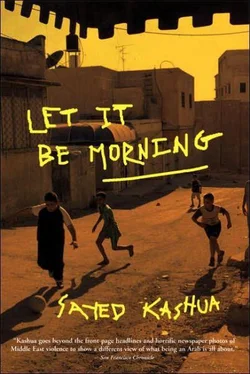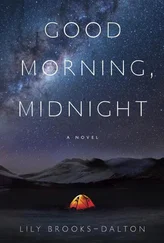Two days and more than a dozen casualties later, the riots were over. I went from funeral to funeral, from mourner to mourner, interviewing parents as they wept and assigned blame and expressed their horror. Then things calmed down. No more tires were burned in intersections, there were no more rallies, no more funerals, and life seemed to be going back to normal. No more spontaneous outbursts like the ones that had cost the locals so dearly. If only it could really have been over in two days — but no, nothing has gone back to what it was before. Ever since those days, something has been broken, something has died. Two days of demonstrations had been enough for the state to delegitimize its Arab population, to repudiate their citizenship. Two days that only served to stoke the Jewish fires of vindictiveness.
Those two days had changed my life. Suddenly my life as an outsider, which had had its advantages, began to get in my way. My being an outsider was what had qualified me for my job and my position, and had given me the language in which I was expert enough to work as a journalist. My being an outsider was beginning to put my life in danger. Even the place where I worked, which I’d always considered a safe haven, had changed. The report I submitted about those two days of demonstrations was the first to be changed beyond recognition, the first story to occasion a meeting with my editor-in-chief, which turned out to be more of a rebuke than a meeting. For the first time I was being accused of having an axe to grind. “Next thing we know, you’ll be blocking the entrance to our offices and expecting us to applaud you,” the editor said, laughing to put me at ease. That was when I realized I was in the process of losing my job. When I saw that the way they treated me depended on the security situation, I began waiting for a letter of dismissal. It was just a question of time, and I knew I didn’t really belong there anymore.
But I wasn’t fired. The newspaper continued using me as a reporter in the West Bank, mainly because I was the only one who could deliver the goods, who could go into the Palestinian cities and villages and come back with stories. But ever since then they’d been keeping an eye on me. Every sentence I wrote was inspected, every word double-checked. I got used to being summoned by the editor-in-chief and being required to provide an explanation for every piece of information I submitted. I learned the rules soon enough, to steer clear of what people were saying and to focus on dry descriptions, sticking to the assignment, as I was told. I adopted the lingo of the military reporters: terrorists, attacks, terrorism, criminal acts . Some of the journalists in the Hebrew press — non-Zionist left-wingers — allowed themselves to lash out against the occupation and against the restrictions imposed on the Palestinian inhabitants, but I no longer dared. The privilege of criticizing government policy was an exclusively Jewish prerogative. I was liable to be seen as a journalist calling for the annihilation of the Zionist state, a fifth column biting the hand that was feeding it and dreaming each night of destroying the Jewish people.
I tried to survive. I’d always been a survivor. I knew how to adapt to my surroundings, working and doing what I wanted. Except that ever since those two bitter days in October, the task of survival had become tougher. I had to be twice as careful, to listen to quips and jabs by colleagues who’d never spoken to me like that before. I smiled when the secretary asked, almost every morning, “So, did you throw any stones in the entrance?” I smiled at the guard who inspected my bags at the entrance to our office building, I laughed when my colleagues talked about the self-indulgent Arabs who were living in Israel and had no idea what it was like when a combat plane is hovering over your house, when a tank heads right into your neighborhood. I laughed out loud, trying to conceal my discomfort, when we’d go out for a bite at the nearby restaurant and one of the others would invariably wink at the guard at the doorway and say, “Better frisk him carefully. He’s suspicious.” I said thank you every time someone told me that “Israeli Arabs really ought to say thank you.” I agreed with my roommates when they criticized the Arab leadership in Israel, I denounced the Islamic Movement when they did, I expressed my grief over every Jewish casualty after a terrorist attack, I felt guilty, I cursed the suicide bombers, I called them cold-blooded murderers. I cursed God, the virgins, Paradise and myself. Especially myself, for doing everything I could to hold on to my job.
But I decided I’d had enough. Somehow I came to the conclusion that it would be much safer to live in an Arab village. Somehow it seemed to me that if I lived in a place where everyone was like me, things would be easier. I’d watch them get married and have children, and I’d feel more comfortable. I needed to return to a place, however small it might be, where Arabs didn’t have to hide. Especially since so many people were returning anyhow. Very few were leaving, and apart from those who’d been banned, everyone would come back sooner or later. I didn’t see any point in telling my wife about my feelings. She’d never have understood.
I’m not going to stay with my in-laws for long. My wife and I hardly look at each other as I try to reassure everyone by telling them, as calmly as I can, about the feverish pace of the work being carried out on our house so it can be ready soon. When I finish, I don’t dare repeat the invitation for my wife and baby to sleep over at my parents’ home. My wife had objected to that idea even before we got here. She said she needs her privacy, and that she would feel uncomfortable in my parents’ home, using the bathroom, for example. It was a declaration that seemed to me like a kind of punishment. I promise to come back to see the baby when she wakes up, and add that my parents have missed her and would also enjoy seeing her, so maybe I’d pick her up for a few hours in the late afternoon. “I’ve got to go now,” I say. “I left the workers alone in the house.”
Ithought I heard some shots, a few rounds. Must be a wedding, or maybe it’s the soldiers in Tul-Karm or Qalqilya, both close by. Even though it’s just a village, the noise in this place is much louder than in the city. It’s after midnight now, and the cruising cars never let up. You can hear them trying to go faster, revving up the motors, ignoring the makeshift speed bumps the neighbors put in, even though they’re just forty or fifty feet apart, but the young drivers won’t miss a chance to build up speed. The really loud screeching of tires, brakes being slammed and motors being pushed to the max are not quite as loud, since they come from a few blocks away, where there are no speed bumps and hardly even any buildings. That’s just how it is. It’s always been the younger generation’s favorite form of entertainment. In the intermittent silences between cars I hear a hodgepodge of noises, some from television sets, some from people talking. I could swear I hear the sound of children playing. What is it with them, being up at such an hour? I remember when we were kids how we’d always show off about how late we’d gone to sleep the night before. I remember I’d always gone to sleep early, or to be precise, I’d always gone to bed early.
Tonight too, I’ve been in bed for two hours already. I was sure I’d fall asleep as soon as I shut my eyes. It had been a tough day. Everything was supposed to be finished by today. Tomorrow is our official moving-in day. Tomorrow I’ll be sleeping with my wife and baby in our new house, together, the way families are supposed to. I don’t know whether the thought reassures or terrifies me. First thing in the morning, my wife and mother-in-law arrived at the new house and started cleaning. Mother joined them, and the three of them spent the next few hours scouring the floor, removing spots of paint, not an easy job. I was in charge of various small but tiring jobs, like putting handles on the doors or hooks in the bathrooms or hanging curtains. I didn’t get to the curtains, because the women needed me to dismantle windows and blinds so they could clean them and the frames underneath. Then I was supposed to put them back in. It isn’t easy to remember which part of the window goes in first. Make even a small mistake and all your work will be wasted. I hated the windows and I couldn’t understand why there should be so many in one lousy house.
Читать дальше












